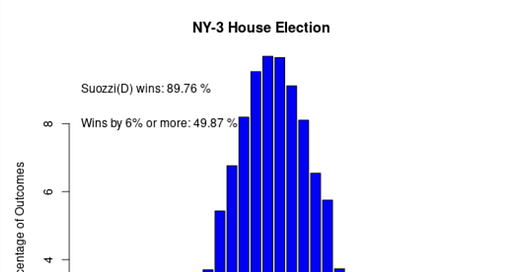There have only been a few quality polls out of NY-3 in the race to replace Santos, but they both point in the same direction: Suozzi (D) is favored.
And not by a little.
Now, unlike the “other” forecasters (none of whom have offered a forecast here, btw) I'll be honest with you:
In ALL elections, no matter how much polling there is, the forecaster must forecast (with a range of assumptions and modeling) and that introduces the possibilities:
1a. The forecast is bad and the polls are good
1b. The forecast is good and the polls are bad
1c. The forecast is good and the polls are good
1d. The forecast is bad and the polls are bad
Anyone who tells you that their forecast is a reflection of “the polls” is lying to you. Every forecast must make assumptions, and model from them.
Polling being inaccurate is only one of many reasons a forecast can miss - and is used as a deflection by forecasters who are afraid of accountability. They don't want to talk about 2022 for that reason (polls extremely accurate, their forecasts were terrible).
The better forecasters make better assumptions. Yes, when you break it all down, it's that simple. On that note:
In elections with very few polls, the forecaster must choose how heavily to weight them.
In swing states, I weight poll data quite heavily - there are dozens of polls.
Here, there aren't many polls, though they do point to Suozzi being favored. So what data do we have?
Partisan lean of the district. Dems performing very well in special elections. Name recognition. Turnout/early voting differential.
None of these factors weigh a lot, but they all (in this case) weigh in the same direction.
If I were a betting man (teehee) I'd be willing to bet that Suozzi gets at least 52% of the vote at even money. That implies he wins by 4.
Realistically, I think it's more likely that number is around 6.
But here's the dirty truth about forecasting that only I will ever tell you, because I'm not a hack:
If my forecast is wrong, that means I'm wrong.
If my forecast is right, that means I'm right.
People who have bad forecasts and then blame “the polls” for their bad forecasts are hacks who are terrified of accountability.
I hope my honesty about how forecasts work (and the need to hold forecasters accountable) is more refreshing than sermonizing.
Vote.




